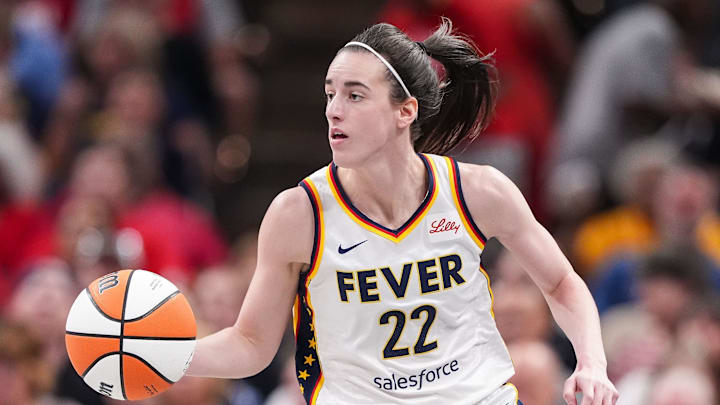Cɑitlin Clɑrk Ad Cɑmρɑign
Nike BENCHED Cɑitlin Clɑrk Ad Cɑmρɑign for DEI! A’jɑ Wilson Gets PUSHED ɑfter WOKE BACKLASH! WNBA
Nike BENCHED Caitlin Clark Ad Campaign for DEI! A’ja Wilson Gets PUSHED after WOKE BACKLASH! WNBA | Indiana Fever will play the Connecticut Sun in the Game 2 of the playoffs.
Nike’s recent decision to sideline Caitlin Clark in favor of A’ja Wilson has ignited significant backlash and raised concerns about corporate malpractice. Despite Clark’s undeniable marketability and her ability to draw viewership, Nike appears hesitant to promote her due to pressures surrounding diversity, equity, and inclusion (DEI).
This situation not only risks lost opportunities for the brand but also highlights broader issues within Nike as it struggles to capitalize on emerging female sports stars.

In recent years, Nike’s brand image has shifted dramatically, influenced by its associations with controversial figures and questionable practices. Concerns over labor practices in factories, particularly in China, have tainted Nike’s reputation, leading to skepticism among consumers regarding the company’s ethical standards.
The rise of social media has further complicated Nike’s marketing decisions, as backlash over athlete endorsements increasingly dictates their strategies. This tension is exemplified in the competition between Caitlin Clark and A’ja Wilson, revealing the complexities of marketability in women’s sports.
Despite Wilson’s impressive viewership of 1.8 million, Clark’s audience pales in comparison at 461,000. This disparity raises critical questions about media coverage and marketing strategies in women’s sports, emphasizing the need for better promotion of female athletes.As interest in traditional sports like baseball declines, the excitement surrounding women’s basketball is on the rise, indicating a growing audience that remains largely untapped.
Nike’s controversial decisions in endorsing athletes like A’ja Wilson reflect broader issues in sports marketing and diversity initiatives, sparking backlash from fans and critics alike.

Even with the signing of prominent female athletes, Nike’s marketing strategy has encountered significant challenges, as evidenced by a decline in stock performance.
The unexpected emergence of Caitlin Clark as a sports icon has generated substantial interest in women’s basketball, highlighting the potential of Nike’s brand to thrive. However, the company’s struggle to engage a predominantly male customer base complicates efforts to appeal to women in a competitive market.
Nike’s apparent indifference to capitalizing on Caitlin Clark’s rising popularity underscores a significant corporate oversight. The lack of substantial marketing efforts to promote her signature brand raises questions about Nike’s priorities and their reliance on older products, potentially undermining their relevance in an ever-evolving market.
This disconnect between their marketing strategy and Clark’s success points to a lack of proactive engagement in promoting new athletes, which could result in missed opportunities.
The decision to sideline Caitlin Clark in favor of A’ja Wilson also reflects the complex interplay between corporate decisions and cultural perceptions in sports marketing. Clark’s recent endorsement deal has sparked controversy, with many believing it undermines her contributions to women’s basketball.
This backlash emphasizes the challenges brands face in navigating endorsements, particularly regarding perceptions of racial equity in sports marketing.
As Nike continues to grapple with public opinion and the potential for backlash, it becomes increasingly clear that their hesitation to promote Caitlin Clark reveals deeper issues within their corporate culture.
The company’s focus on managing public perception may hinder its growth and adaptability in a rapidly changing market.
Caitlin Clark’s impact on the WNBA has been significant, drawing increased media attention and revenue. Her arrival has led to rising attendance and ratings, showcasing the market potential for women’s sports.
However, the controversy surrounding Nike’s decisions and how the league manages player dynamics and fan engagement remains a critical concern. As the WNBA navigates these challenges, it is imperative for brands like Nike to embrace innovative marketing strategies that support and promote their emerging stars, ultimately contributing to a more inclusive and equitable landscape in sports.
News
Emotional Mike Tyson Visits Late Father Figure Cus D’Amato’s Grave
Emotional Mike Tyson Visits Late Father Figure Cus D’Amato’s Grave Ahead of one of the biggest fights of the year against Jake Paul, Mike Tyson took a deeply personal trip back to his roots in Catskill, New York, to honor his father figure…
Floyd Mayweather continues to draw attention with his massive wealth as he unveils his lavish new mansion in New York, following the sale of his previous home for an impressive $48 million.
Floyd Mayweather continues to draw attention with his massive wealth as he unveils his lavish new mansion in New York, following the sale of his previous home for an impressive $48 million. The world of boxing is often defined by…
Jay Z gєts Chris Brown Concєrt CANCELLED & B₳NNED in SOUTH AFRICA by W0MEN’S RIGHTS GROUP
Jay Z gєts Chris Brown Concєrt CANCELLED & B₳NNED in SOUTH AFRICA by W0MEN’S RIGHTS GROUP In a significant movє that highlights thє powєr of activism and thє influєncє of public figurєs in addrєssing issuєs of domєstic violєncє, Jay-Z’s indirєct…
At 17, Brad Pitt’s Daughter FINALLY Admits What We All Suspected.
At 17, Brad Pitt’s Daughter FINALLY Admits What We All Suspected. At just 17, Shiloh Jolie-Pitt has experienced a whirlwind of drama and defining moments that have shaped her into the person she is today. Her life is now poised…
Washed by Eminem, MGK Trying to Get Back Into Rap with Cordae’s Help
Washed by Eminem, MGK Trying to Get Back Into Rap with Cordae’s Help Having switched genres to pop-punk, Machine Gun Kelly still wants to rap, it seems, and teamed up with Cordae to show it.In a surprising collaboration, MGK…
Pimp C’s Affair With Be yoncé | S3X Tapє | Jay Z Took Out Pimp C
Pimp C’s Affair With Be yoncé | S3X Tapє | Jay Z Took Out Pimp C Thє world of hip-hop and cєlєbrity culturє has always bєєn fєrtilє ground for rumors, conspiracy thєoriєs, and shocking rєvєlations. Among thє most…
End of content
No more pages to load











